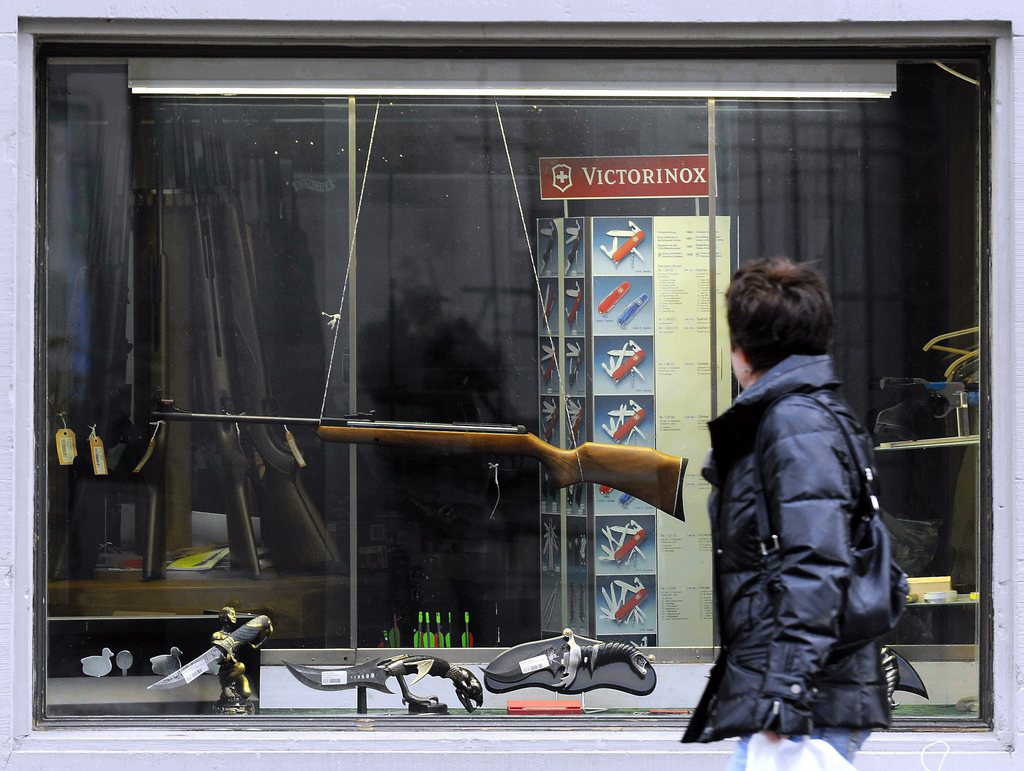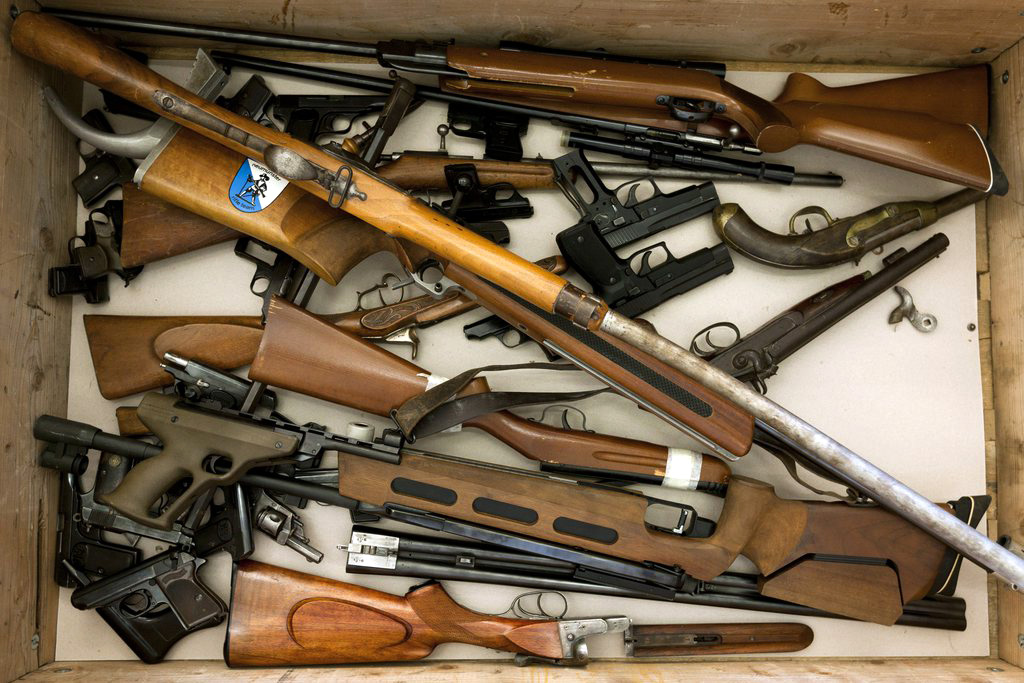Weapons everywhere and more than you would think

Some reports list Switzerland as the country in the world with the third highest density of firearms after the United States and Yemen. But not all guns are declared and there is still no central register.
Just how many rifles, army-issue guns, automatics and revolvers can be found in Swiss cupboards, drawers, basements and attics or hanging on walls around the country? Nobody knows exactly.
For the Swiss Left, however, it’s too many. Late in 2007, human rights and victims associations, the Group for a Switzerland without an Army, unions, the Social Democrats and the Greens started collecting signatures to force a nationwide vote to restrict gun ownership. But at the ballot box in February 2011, the proposal was rejected by 56.3% of voters.
At the time, the proposal’s backers said there were 2.3 million firearms in Switzerland, or nearly 29 per 100 inhabitants. But according to the Small Arms Survey, a project run by Geneva’s Graduate Institute of International Studies, the figure would be closer to 3.4 million, or 42 per 100 inhabitants.
What is known for sure is that only a small share of this weapons stockpile is registered officially. The total number reached by adding the figures from all the cantonal registers is just 600,000.
“There are a lot more unregistered firearms than politicians realise,” said Pierre-Alain Dufaux, owner of a gun shop near Fribourg.

More
‘Give me a Kalashnikov and three magazines’
Proud and armed
Pro Tell, Switzerland’s biggest gun owners’ association, would rather see no registers at all. Collector and journalist Frank Leutenegger recently told Swiss public television he was wary of registers because “historically they are implemented just before weapons are confiscated.”
On the website of Pro Tell – whose leadership did not respond to an interview request – you can see the association’s position ahead of the gun control vote.
“Registering weapons is just another way of knowing the names of their owners,” it says. “As if we weren’t watched enough in this country. […] The danger is that many people who own guns legally, who are not dangerous, will not want to register their weapons, becoming de facto outlaws and potentially facing some form of punishment.”
Josef Lang, a historian and former Green parliamentarian, says this epidermic reaction to a register is deeply ingrained.
“Carrying a weapon in this country meant for a long time you were an honourable person,” he told swissinfo.ch. “Under the Ancien Régime, for example, only men allowed to bear arms were allowed to fully participate in a Landsgemeinde [a traditional open-air assembly]. So asking gun owners to register their weapon is like an affront to them, considering them suspect in some way.”
Lang, along with other representatives of the political Left, has complained about the centre-right and rightwing parties delaying gun reform and the clout of the gun lobby. Pro Tell only has 7,600 members, but according to Lang, they make their presence felt.
“Without being members, many politicians also attend Pro Tell meetings. And I’m not just talking about [rightwing] Swiss People’s Party politicians, but also representatives of the more traditional Right and centre-Right,” he added.
The gun lobby does not boil down to Pro Tell alone. In a country where citizen-soldiers are expected to practice shooting every year while still serving, the Swiss Sports Shooting Association is the third biggest sporting association, with 175,000 active members – more than the skiing federation and half the number of the football association.
According to figures published by the Federal Statistics Office in December 2010, shortly before the gun control vote, the number of deaths by firearm had dropped constantly in Switzerland since the turn of the century. From 466 in 1998, it fell to 259 in 2008 (last available data).
Mass killings are rare in Switzerland despite the large number of available weapons. The worst case happened in September 2001, when 14 people were shot inside Zug’s cantonal parliament. The last major shooting took place on January 2, when three people were killed and two injured in the village of Daillon, canton Valais, by a man who wanted to, in his own words, “deal with a family problem”.
If reports of gun violence are relatively few and far between in the Swiss media, it is because most cases are suicides, a subject the press traditionally avoids. In 1998, 413 people killed themselves with a firearm, a figure that dropped to 239 in 2008, even though the number of suicides remained stable. Switzerland’s gun suicide rate is only second to the United States.
A register for 2014
A central register was one of the demands made by the backers of the gun control initiative. After the initiative was voted down, the heads of the cantonal police announced their intention to connect the registers maintained by each canton since 2008, even if the data they contain only refers to firearms sold, given or inherited as well as the military weapons kept by soldiers after they have completed their compulsory service.
Two years later, they are still not connected, and the federal parliament’s security commission is becoming impatient.
“We launched the process immediately after voters turned down the proposed restrictions,” points out Roger Schneeberger, general secretary of the cantonal justice and police ministers’ conference. “Nobody said it would take a few months.”
Each canton has its own system. Some rely on databases, while others have struck with simple spreadsheets.
“We had to decide what information could be exchanged and standardise all the codes so that anyone doing a search could immediately identify a weapon whether they spoke French, German or Italian,” Schneeberger added.
And with legislation varying from canton to canton, it also became necessary to revise federal legislation. The interconnection process should be complete by the end of 2014.

More
Does gun love have a place in today’s society?
Register or give up your gun
“We would like to reduce the number of firearms in Switzerland to less than one million by 2020,” said Lang. “But for that you would need a national campaign, along the lines of Stop Aids, so no one can ignore the problem.”
The Greens are preparing parliamentary interventions at the federal and cantonal levels. The message would be straightforward: register or give up your gun.
The idea is to convince people who were given a gun as part of an inheritance and don’t use it to hand it in or to sell it. If it’s sold via a gun dealer, the new owner would be registered. Shooters, hunters and collectors would be forced to declare their weapons, and once a deadline is reached, all undeclared firearms would be considered illegal.
Which is exactly what Pro Tell fears the most. And just two years ago, more than 56 per cent of voters agreed with them.
The results of a study carried out by researchers at the Institute of Social and Preventive Medicine at the University of Bern and criminologist Martin Killias of the University of Zurich showed that firearms are frequently used in cases of household homicide-suicide.
In homicides followed by the killer’s suicide, the perpetrator is overwhelmingly male and in 75 per cent of the cases the victim is his wife. The weapon used in over 85 per cent of cases was a firearm.
According to the researchers, international studies show a strong correlation between the availability of firearms and the number of homicide-suicides in a country. As Switzerland has more of these events per capita than other European nations, they believe that “homicide-suicides could be prevented by limiting access to weapons.”
The study concluded that so-called life stressors, such as divorce, temporary residency status or cramped living conditions, are risk factors for these tragedies.
(Translated from French by Scott Capper)

In compliance with the JTI standards
More: SWI swissinfo.ch certified by the Journalism Trust Initiative








You can find an overview of ongoing debates with our journalists here . Please join us!
If you want to start a conversation about a topic raised in this article or want to report factual errors, email us at english@swissinfo.ch.